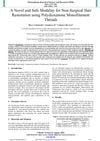 8 citations,
May 2022 in “International journal of nanomedicine”
8 citations,
May 2022 in “International journal of nanomedicine” Lecithin-encapsulated resveratrol nanoparticles could be a safe and effective anti-cancer treatment.
 11 citations,
November 2021 in “Clinical, Cosmetic and Investigational Dermatology”
11 citations,
November 2021 in “Clinical, Cosmetic and Investigational Dermatology” Resveratrol may help hair grow, but more research is needed.

Resveratrol improved hormone levels, menstrual cycles, hair loss, and ovarian function in PCOS patients.
 April 2018 in “Journal of Investigative Dermatology”
April 2018 in “Journal of Investigative Dermatology” Resveratrol activates the Nrf2 pathway in human skin, significantly increasing the production and distribution of the antioxidant glutathione.
 42 citations,
November 2004 in “Paediatric Respiratory Reviews”
42 citations,
November 2004 in “Paediatric Respiratory Reviews” Children generally have milder SARS symptoms than adults, with good outcomes and no deaths reported, but long-term effects are unclear.
 17 citations,
January 2001 in “Clinical and Experimental Dermatology”
17 citations,
January 2001 in “Clinical and Experimental Dermatology” Early treatment with immunoglobulin and aspirin reduces heart complications in children with Kawasaki disease.
8 citations,
January 2019 in “Journal of cosmetic dermatology” Modified phenol peels effectively reduced stubborn skin pigmentation in patients with Lichen Planus Pigmentosus.
 43 citations,
February 2020 in “Clinica chimica acta”
43 citations,
February 2020 in “Clinica chimica acta” Nano-sized plant-based chemicals could improve cervical cancer treatment by being more effective and causing fewer side effects than current methods.
 January 2000 in “Expert Opinion on Therapeutic Patents”
January 2000 in “Expert Opinion on Therapeutic Patents” The document highlights various patents for new compounds with potential treatments for multiple diseases, including cancer, hormonal disorders, and diabetes.
18 citations,
February 2021 in “Dermatologic therapy” Public interest in skin issues changed during COVID-19, with more focus on dry skin, hair problems, and hand eczema.
 8 citations,
March 2020 in “Frontiers in Cell and Developmental Biology”
8 citations,
March 2020 in “Frontiers in Cell and Developmental Biology” Researchers created immortal human skin cells with constant testosterone receptor activity to study hair loss and test treatments.
 5 citations,
June 2015 in “Journal of Investigative Dermatology”
5 citations,
June 2015 in “Journal of Investigative Dermatology” Feathers are useful for researching growth, regeneration, and the effects of treatments like chemotherapy on hair loss.
 August 2024 in “International Journal of Science and Research (IJSR)”
August 2024 in “International Journal of Science and Research (IJSR)” PDO threads are effective and safe for non-surgical hair restoration.
December 2024 in “Tissue and Cell” A new method helps detect androgen receptor movement in cells, aiding research on hair loss treatments.
 91 citations,
May 2005 in “The Journal of Clinical Endocrinology & Metabolism”
91 citations,
May 2005 in “The Journal of Clinical Endocrinology & Metabolism” A new mutation in the human glucocorticoid receptor reduces its function and causes resistance to glucocorticoids.
 115 citations,
June 2004 in “Pediatrics”
115 citations,
June 2004 in “Pediatrics” Children, especially teenagers, can get severe SARS-CoV infection with symptoms similar to adults, but they typically recover well with supportive care.
 85 citations,
March 2012 in “Revista Brasileira de Farmacognosia”
85 citations,
March 2012 in “Revista Brasileira de Farmacognosia” The genus Sophora has compounds with potential health benefits and could lead to new drugs, but more research is needed to understand their effects and safety.
 22 citations,
October 2020 in “Frontiers in Cell and Developmental Biology”
22 citations,
October 2020 in “Frontiers in Cell and Developmental Biology” Fisetin, a type of polyphenol, may help hair grow by increasing certain protein activities in cells.
 15 citations,
January 2013 in “European Journal of Pediatrics”
15 citations,
January 2013 in “European Journal of Pediatrics” Patients with Shwachman-Diamond syndrome often get misdiagnosed due to a wide range of symptoms, including immune system problems and bone abnormalities.
 11 citations,
September 2021 in “Journal of molecular endocrinology”
11 citations,
September 2021 in “Journal of molecular endocrinology” ERβ has potential in treating prostate cancer and neurodegenerative diseases, but human studies are needed before clinical use.
 3 citations,
December 2019 in “Biomedical dermatology”
3 citations,
December 2019 in “Biomedical dermatology” Sonic hedgehog proteins may help grow hair.
 1 citations,
March 2015 in “Journal of Visualized Experiments”
1 citations,
March 2015 in “Journal of Visualized Experiments” Researchers developed a new, precise method to measure hair loss in mice using image analysis.
 April 2018 in “Journal of Investigative Dermatology”
April 2018 in “Journal of Investigative Dermatology” Stabilizing HIF1A in hair follicles increases glycolysis, which may help reduce oxidative stress and support hair growth.
 11 citations,
May 2021 in “Journal of Medical Virology”
11 citations,
May 2021 in “Journal of Medical Virology” Men are more likely to have severe respiratory viral infections like COVID-19 due to hormonal and genetic differences, while women generally have stronger immune responses.
 7 citations,
November 2020 in “Experimental Dermatology”
7 citations,
November 2020 in “Experimental Dermatology” Different cell types work together to repair skin, and targeting them may improve healing and reduce scarring.

Plant-based compounds can improve wound dressings and skin medication delivery.
 August 2024 in “Drug Design Development and Therapy”
August 2024 in “Drug Design Development and Therapy” Decursin shows promise for treating cancer, neuroprotection, inflammation, and hair loss.
 December 2023 in “Journal of Drugs in Dermatology”
December 2023 in “Journal of Drugs in Dermatology” Media coverage increased public interest in oral minoxidil for hair loss but may also spread misinformation.
January 2023 in “Journal of Cosmetic Dermatology” Alopecia areata gained more interest on social media than pattern hair loss, with TikTok showing more personal stories and YouTube offering higher quality educational content.
16 citations,
May 2011 in “The Journal of clinical investigation/The journal of clinical investigation” Some skin tumors may start from hair follicle stem cells.

























